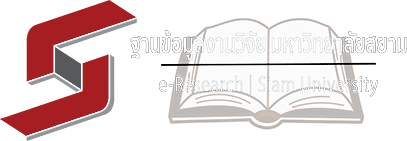- KB Home
- หลักสูตรปริญญาตรี|Bachelor Degree
- คณะบริหารธุรกิจ
- -สาขาวิชาการจัดการทั่วไป
- Promoting sustainability literacy for students in Thai higher education institution: A case of Siam University
| Title: | Promoting sustainability literacy for students in Thai higher education institution: A case of Siam University |
| Researcher: | Chanita Rukspollmuang, Tachagorn Chansema |
| หลักสูตรที่สอน: Degree: |
Doctor of Philosophy Program in Educational Administration Innovation, Bachelor of Business Administration in General Management and Entrepreneurship |
| Major: | Ph.D. in Educational Administration Innovation, B.B.A. (General Management and Entrepreneurship) |
| Faculty of study: | Graduate School, Faculty of Business Administration |
| Academic year: | 2024 |
| Published: | International Journal of Comparative Education and Development. https://doi.org/10.1108/IJCED-07-2023-0065 Click |
Abstract
Purpose
The objectives of this study were (1) to explore and analyze sustainability literacy of undergraduate students and (2) to propose guidelines for promoting sustainability literacy of the undergraduate students at Siam University, Bangkok, Thailand.
Design/methodology/approach
A 5-point rating scale survey questionnaire was used to collect data from 235 students registered in General Education courses in Semester 2 of academic year 2022. The analyzed data was presented to a focus group discussion, conducted with 19 internal and external stakeholders, as a basis to propose guidelines for promoting sustainability literacy.
Findings
The students perceived that they had better knowledge about sustainable development and sustainable development goals (SDGs) and that their knowledge about and degree of participation in SDGs-related activities were at high level. Intrapersonal competence was rated as their highest sustainability competence, followed by futures-thinking, and systems-thinking. The focus-group suggested that competency-based GE curriculum should be used as a platform to enhance sustainability literacy. Guidelines concerning learning outcomes, learning content, learning culture, learning with technology, and learning assessment were then proposed.
Research limitations/implications
The study’s methodological limitations include the use of purposive sample case of the Siam University and self-perceiving assessment survey instrument for the data collection that provide sufficient insights on the present state and problems concerning sustainability literacy of university students.
Practical implications
Sustainability is one of the national pillars in Thailand 20 years strategy (2018–2037). Hence, the government encourages all educational institutions, including universities to transform themselves toward this goal. Siam University has used education program as a vehicle to meet this aspiration. Lesson learnt from the study will not only benefit the university per se but will be valuable for practices in other universities. In addition, findings and implications from the study will help accelerate the transformation of Thai higher education institutions toward sustainable universities.
Social implications
Sustainability has been promoted in education and social context. Siam University is recognized as a leading university in promoting campus and community sustainability through our “living learning lab” approach. We have used social living labs for teaching and learning activities for years. Partnerships among academia, private and public sectors, as well as community members will benefit from this research.
Originality/value
The study explores the scholarly topic of significant social importance and implications in the Thai context. The present study on sustainability literacy opens a path for further research and cross-institutional and national comparative studies on the issue.
Keywords: Sustainable development, SDGs, Sustainable literancy, Sustainable competence, Higher education


